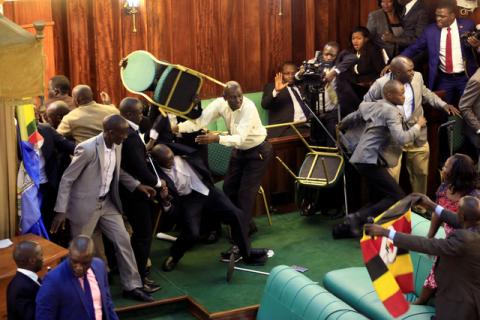Advertisement
Lawmakers brawl in Uganda parliament for second day over presidential age limit
KAMPALA (Reuters) - Lawmakers brawled in Uganda's parliament for a second day running on Wednesday over a fiercely disputed move to change the constitution to let long-ruling President Yoweri Museveni run for re-election after age 75.
MPs exchanged blows and kicks, with some using microphone stands as crude weapons in the melee, and at least two female lawmakers were carried out of the chamber after collapsing, a Reuters journalist on the scene said.
At least 25 MPs opposed to the proposed constitutional amendment to prolong Museveni's tenure were forcibly ejected on orders of the speaker for involvement in fighting on Tuesday. All other like-minded MPs then walked out.
After calm returned, ruling party MP Raphael Magyezi introduced the contested motion authorising parliament to draft and present a bill that would lift the constitution's age cap on presidential candidates.
The motion passed, parliament communications director Chris Obore told Reuters, adding that Magyezi would have about a month to submit the bill to a first reading in the House.
Under the existing constitution, eligibility to stand as a presidential candidate in the East African country has an age ceiling of 75.
That makes Museveni, 73, in power since 1986 and increasingly accused of authoritarianism and a failure to curb corruption, unqualified to seek re-election at the next polls in 2021. Removing the age cap would erase that barrier.
The proposal, echoing steps by other veteran African leaders to void legal limits on their rule, has stirred widespread resistance from rights activists, opposition parties, religious leaders and even some members of Museveni's party.
Fisticuffs first broke out in the Kampala parliament on Tuesday, leading Uganda's communication regulator to ban live broadcasts of events "inciting the public".
"PUBLIC INSECURITY"
In a notice on Wednesday, the Uganda Communications Commission said radio and television stations should stop live broadcasts of events that "are inciting the public, discriminating, stirring up hatred, promoting a culture of violence ... and are likely to create public insecurity."
No station aired Wednesday's proceedings, but some posted clips of the brawls on their Twitter feeds.
Uganda's two major privately owned TV stations, including a local unit of Kenya's Nation Media Group, and some radio stations carried Tuesday's parliamentary session live.
Critics said the authorities' action to ban live broadcasts underscored a crackdown on anyone questioning the planned constitutional amendment.
Since last week, when a motion to kick-start the amendment process was supposed to be read but never made it to the floor, both police and military personnel have been deployed around the parliament and many parts of the capital.
Protests by students and opposition activists and supporters in Kampala against the amendment, sometimes broadcast live, have been put down with tear gas and arrests of scores of people.
Media in Uganda routinely complain of harassment by security personnel. Journalists say they have been beaten, detained or their equipment damaged or confiscated during coverage of anti-government demonstrations.
On Tuesday, anti-government protests also occurred in other parts of the country, including in the northern town of Lira. Three local journalists there were arrested as they covered the protests, according to Hudson Apunyo, an official in a journalists' association in the area.
Robert Ssempala, national coordinator for Human Rights Network for Journalists-Uganda, said banning live broadcasts was "to shut out Ugandans and keep them in the dark on the age limit debate" after the measure met broad resistance.
(Editing by Mark Heinrich)



















Add new comment